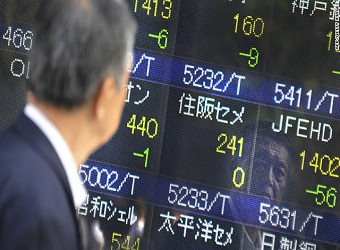Major Asian equities were mixed in Monday trade, with a broad index of Asia Pacific shares recording a moderate decline, as investors digested elections in Germany and New Zealand over the weekend.
Japan’s Nikkei 225 rose 0.5 percent, or 101.13 points, to close at 20,397.58, as automakers and trading houses notched gains. The yen was softer against the dollar as markets weighed news of a potential snap election ahead in Japan.
Across the Korean Strait, the Kospi reversed early gains to slide 0.35 percent, falling for the fifth straight session. The benchmark index finished the session at 2,380.4.
Down Under, the S&P/ASX 200 pared gains to finish the session 0.03 percent higher at 5,683.7, with the health care sub-index leading gains. The heavily-weighted financials sub-index closed flat.
Greater China markets traded lower across the board. Hong Kong’s Hang Seng Index declined 1.41 percent by 3:15 p.m. HK/SIN, dragged by a fall in property stocks. The Shanghai Composite shed 0.35 percent to close at 3,340.8091 and the Shenzhen Composite sank 1.242 percent to end at 1,963.8951.
The MSCI Asia Pacific ex Japan index was down 0.84 percent by 3:17 p.m. HK/SIN.
The euro and Kiwi dollar were in focus as markets digested political headlines from the German and New Zealand elections.
German Chancellor Angela Merkel’s Christian Democratic Union party looked set to remain the largest party in the next German parliament, according to a Sunday exit poll. Merkel’s Christian Democratic Union party, together with its sister-party the Christian Social Union, won 32.5 percent of the vote, broadcaster ARD’s exit poll showed. Merkel’s bloc is expected to form a coalition after achieving a poorer-than-expected result.
Meanwhile, the Alternative for Germany (AfD) party was expected to become the first far right party to enter the Bundestag in around 70 years, with an indicated 13.5 percent of the vote.
“With a fractious political landscape amid the rise of nationalist politics, this is likely to hold back Merkel’s plan with France’s Macron on further euro zone integration,” said Zhu Huani, a market economist at Mizuho Bank, in a morning note.
The euro fell after trading around the $1.193 handle for most of the Asian trading day as political uncertainty weighed. The common currency stood at $1.1908 at 3:00 p.m. HK/SIN.
Elsewhere, the New Zealand election saw Prime Minister Bill English’s National Party win the most votes, although it came short of securing a majority in parliament. That weighed on the Kiwi dollar, which fell to its lowest levels in about a week, as investors tracked coalition negotiations. The currency last stood at $0.7274, off the $0.73 handle seen most of the previous week.
Politics were also in the spotlight in Japan, after Prime Minister Shinzo Abe on Monday announced plans to put together a $2 trillion yen ($17.8 billion) stimulus package, according to Reuters. Abe was expected to call for a snap election during a press conference later in the day, Reuters said. The Japanese currency was softer against the U.S. currency at 112.28 yen to the dollar.
The pound was on the radar after Moody’s downgraded Britain’s sovereign credit rating over the weekend to Aa2 from Aa1. Investors also weighed British Prime Minister’s highly-anticipated Brexit speech in Florence on Friday, which turned up few specifics as to what the transition period would look like before the U.K. left the EU completely. Sterling edged up to trade at $1.3546 at 3:10 p.m. HK/SIN compared with as high as $1.3595 on Friday.
Ahead, markets are expected to shift their attention to central banks after politics dominated the weekend. European Central Bank President Mario Draghi, Fed Chair Janet Yellen and Bank of England Governor Mark Carney are all expected to speak during the week.
In stocks, property stocks listed in Hong Kong and China took a tumble on Monday after new measures were introduced to cool the mainland housing market. Average new home prices in China rose 0.2 percent in August from the previous month, compared with a 0.4 percent rise in July.
Hong Kong-traded shares of heavyweight China Vanke were down 7.24 percent by 3:10 p.m. HK/SIN, while the company’s Shenzhen-traded stock closed 6.08 percent lower. Hong Kong-listed Evergrande was down 9.83 percent.
In New Zealand, Fonterra stock closed up 1.64 percent after the dairy company reported on Monday that full-year profit declined 11 percent to NZ$745 million ($542 million). Revenue for the year rose 12 percent to NZ$19.2 billion ($13.98 billion).
Over in Japan, Toshiba pared steeper losses to close down 0.33 percent as other tech stocks proved a mixed picture. The conglomerate had announced last week that it would sell its memory chip unit to a consortium led by Bain Capital, although stumbling blocks could lie ahead.
Stateside, U.S. equities closed mostly unchanged on Friday, but made gains on the week. The Dow Jones industrial average edged down 0.04 percent, or 9.64 points, to close at 22,349.59.
On the energy front, oil prices held onto most gains after rising on Friday when oil producers announced they could wait until next year to make a decision on output cut extensions. Brent crude slipped 0.11 percent to trade at $56.80 a barrel and U.S. crude edged down 0.28 percent to $50.52.
Source: CNBC


